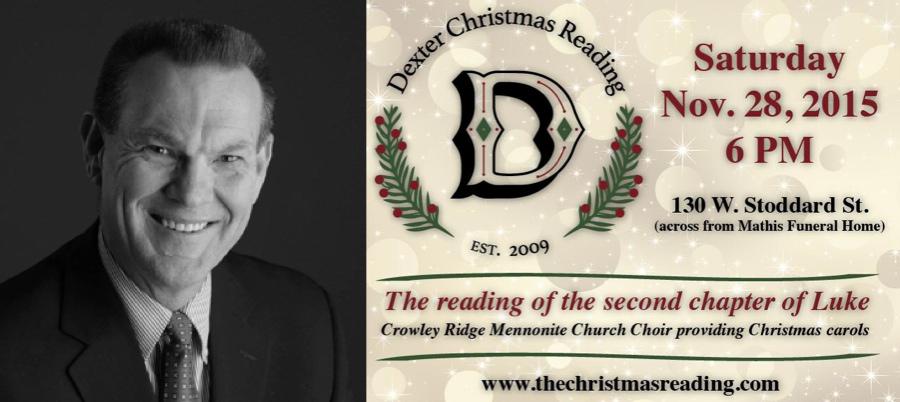
Dexter, Missouri - Each year our community gathers in downtown Dexter to officially welcome the holiday season with an inspirational reading from the Second Chapter of Luke.
The Christmas Reading began in 2009 by Greg Mathis and follows a longtime family tradition.
“Too often we tend to get caught up in the rush of the holiday season,” Mathis said. “It is simply a reading by a special person in the local community who tells aloud the true story of the first Christmas.”
The annual Christmas Reading will be held across from Rainey-Mathis Funeral Home on Stoddard Street at 6:00 p.m. Saturday, November 28th. The Crowley’s Ridge Mennonite Church Choir will perform Christmas carols following the reading.
The public is invited and encouraged to attend this beautiful event. Dress warm and bring a lawn chair!
For more information click HERE.

One of the earliest truths a child learns in Sunday school is that God is good. The simplicity of these three words masks the depth of such a remarkable attribute of the Lord. He is absolutely perfect and holy, which means that He alone is the standard of all righteousness. And since the expression of the Father’s goodness is revealed in His actions, all that He does is just and right, because He cannot violate His own nature.
Also, God does not change. Therefore, it is His character, not our behavior, that determines how He deals with us. This means He is good to us even when we are living in rebellion. As a loving heavenly Father, He responds to our disobedience with discipline, which is designed to restore the broken relationship rather than crush the wayward child.
The Lord’s goodness is expressed in a multitude of ways. He is our Creator, and we are His people. Every breath we breathe is given to us by God. As our loving Shepherd, He watches over us and provides for all our needs. But the greatest expression of divine goodness is the cross of Jesus Christ. What humanly appeared to be the ultimate in cruelty and unfairness was the only way to rescue mankind and prevent eternal separation from the Lord.
Believing in God’s goodness is one of the pillars of our faith. This truth fills us with joy in happy times and grounds us with confidence during periods that feel hard, unfair, or painful. When we don’t understand what the Lord is doing, we can trust His heart and know that He cares for us.

At times people are bound by guilt long after the feeling should have been resolved. For some, this is appropriate because they refuse to give up the sin that brought it on. Others suffer the weight of false guilt because they harbor shame that doesn’t belong to them. Whatever the root cause of your self-condemnation, the battle plan remains the same.
Victory over guilt begins with understanding that the Savior took our shame to the cross and paid our penalty. Without Jesus, this would have been impossible because there is no way that we could pay for our own sin. But we do need to honestly identify the source of our guilt and confess before God. That means we agree with His perspective on what we’ve done—in other words, we admit when we are wrong. Repentance goes a step further: We turn away from wrong and choose to do right.
Confronting guilt in this way replaces our burden of shame with peace and joy, which are far lighter and more freeing. And an amazing side effect is that we have wisdom to share. Openness about our past mistakes, consequences, guilt, burdens, and forgiveness can reveal the Lord to those in our sphere of influence. Through our witness, God may reach others who need their chains of guilt broken.
The battle to overcome guilt is one that should not be delayed. The feeling won’t just go away. Whether your condemnation is true or false, it needs to be dealt with quickly. Stop running, and face the source of your guilt. It’s time to end your captivity and start walking in the joy of God’s blessing.

The gospel’s effectiveness is greatly hindered by Christians who act differently at church than they do elsewhere. The way we live for God should permeate all areas of life. The workplace is no exception.
Our behavior reflects our faith. So if we claim to be Christians, then our coworkers will equate our attitudes and actions with Jesus. Do those around you at the office see a positive reflection of God in your work ethic?
Let’s look at a scriptural model for the believer to follow. For one thing, as we read in today’s passage, we should view ourselves as servants and be willing to put the needs of others before our own. Next, our true boss is Christ; therefore, we work diligently and with integrity, knowing that our reward is from Him (Col. 3:23). Then, since all authority on earth is God-given (Rom. 13:1), we should obey our superiors gladly—unless, of course, our human bosses tell us to do something that goes against Scripture. And finally, all those we work with and for have worth from the Creator, so we should treat them with respect (1 John 4:7-8).
Think about the Golden Rule—Do unto others as you’d have others do unto you—and how it applies here. Putting it a different way, imagine yourself as the boss and ask, How would I like my employees to work, whether I was watching or not?
We are to work as though God is our boss. That means doing tasks with joy, a servant attitude, respect for others, diligence, and obedience. Imagine what the workplace could be if all believers approached their jobs this way.

Loneliness will creep into every life at some point. But believers are never truly alone because God has given us a permanent companion—the Holy Spirit. He is the Helper who is with us forever.
No one can truthfully promise to always be available to another person; the realities of time, distance, and even death can separate two people who would rather face difficulties together. Thankfully, by sending the Holy Spirit to live inside of us, Jesus Christ keeps His promise to never leave or forsake us (Heb. 13:5). This means that the relationship with our Companion is greater than any human relationship we have. Since God’s Spirit is a person of the Trinity, He is able to meet our every need. His foreknowledge allows Him to prepare our hearts and minds for any situation.
Human beings weren’t meant to live alone. God designed us to be complete only when we are indwelt by His Spirit, which occurs upon our salvation. We can choose to ignore the Holy Spirit however. For example, some people stubbornly attempt to live the Christian life in their own strength or skip Bible reading when they find meditating on the Word inconvenient. That kind of life is marked by discontent: Peace will be fleeting, and loneliness will feel like the heart’s permanent resident.
The Holy Spirit is our parakletos, or companion who “walks beside.” If we hold Him at arm’s length, we distance ourselves from the Father as well. But if we ask the Spirit to guide our steps and open our minds to God’s ways, He is available.

